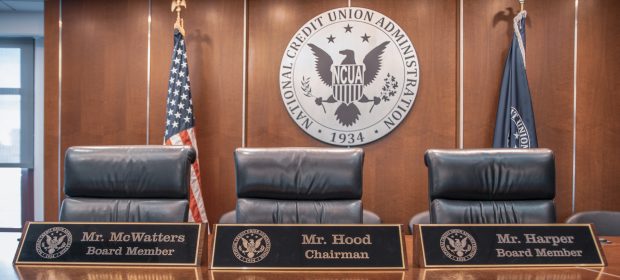 The NCUA Board (Source: NCUA)
The NCUA Board (Source: NCUA)
Credit unions had better be prepared to pay a premium sometime in the future since the coronavirus crisis is likely to continue to wreak havoc on the NCUA's Share Insurance Fund equity ratio, NCUA Board Member Todd Harper said Thursday.
"It is not a question of whether we will charge a premium, but a question of when," Harper said at the board's November meeting. He later added, "Credit unions need to brace themselves for that eventual reality."
Recommended For You
Harper's comments take on greater importance, since with the victory of President-elect Joe Biden, Harper, a Democrat, is likely to be appointed board chairman next year.
However, in a related development, Senate Majority Leader Mitch McConnell (R-Ky.) moved Thursday to try to ensure that even if Harper assumes the chairmanship, Republicans will continue to have the majority on the agency board. McConnell filed a cloture motion on the nomination of Republican Kyle Hauptman to be a member of the NCUA board. That likely means that the nomination will come to the Senate floor in early December. If Hauptman is confirmed, he and Republican Rodney Hood would also be board members.
If Hauptman is not confirmed by the agency's Dec. 17 meeting, current member J. Mark McWatters will remain on the board. That could doom the upcoming agency 2021 budget, since Harper and McWatters made it clear they oppose the budget prepared by Hood.
NCUA CFO Eugene Schied told the board Thursday that the agency's equity ratio stood at 1.22% at the end of June. He said the ratio will be updated based on December estimates.
Hood testified before House and Senate committees last week that the ratio stood at 1.32%. Agency officials said that Hood used the estimated equity ratio that will be calculated after the agency collects $1.5 in capitalization deposits.
If the equity ratio dips below 1.20%, the agency would be required to develop a restoration plan that could include a premium.
Harper said he would like the NCUA board to ask Congress for more flexibility in the way it monitors the equity ratio. He said that it hurts the agency when it must charge a premium during an economic downturn.
Board Member J. Mark McWatters, who would leave the board if Hauptman is confirmed, said he believes the board should modify its policy and provide monthly updates on the equity ratio, rather than the quarterly reports that now are used.
"The public dissemination of this information is of particular relevance as the COVID-19 pandemic rages and the resulting stresses on the credit union community and the NCUSIF continue," he said.
In other business, Monica Davy, director of the NCUA Office of Minority and Women Inclusion, presented the agency's 2019 Credit Diversity Self-Assessment report. Davy told the board that only 118 credit unions responded to the voluntary survey, but that the number has increased each year.
Davy said some credit union officials do not respond to the survey because they fear how the information will be used. She said that no agency examiners have access to the results of the survey, and that fear could be addressed if the NCUA chose to hire a third-party company or organization to conduct the survey.
The board also approved a proposed rule to allow credit unions to capitalize interest in connection with loan modifications made due to the economic problems caused by the pandemic.
"The board has determined that the current prohibition on authorizing additional advances to finance unpaid interest may be overly burdensome and, in some cases, hamper a federally insured credit union's good-faith efforts to engage in loan workouts with borrowers facing difficulty because of the economic disruption that the COVID-19 event has caused," agency officials said in issuing the proposed rule.
© Touchpoint Markets, All Rights Reserved. Request academic re-use from www.copyright.com. All other uses, submit a request to [email protected]. For more inforrmation visit Asset & Logo Licensing.






